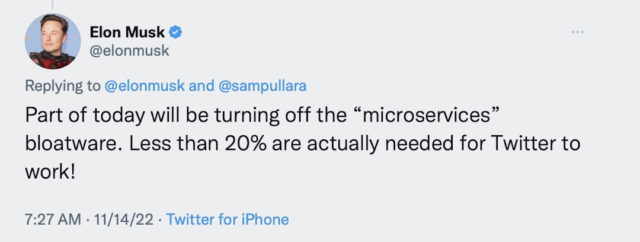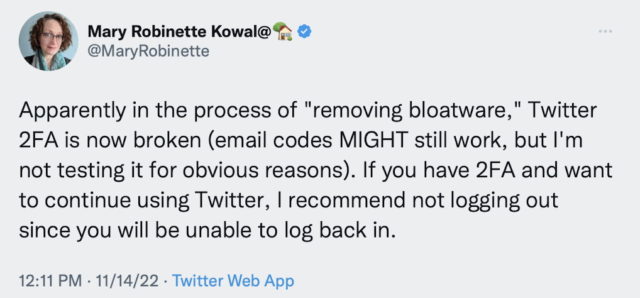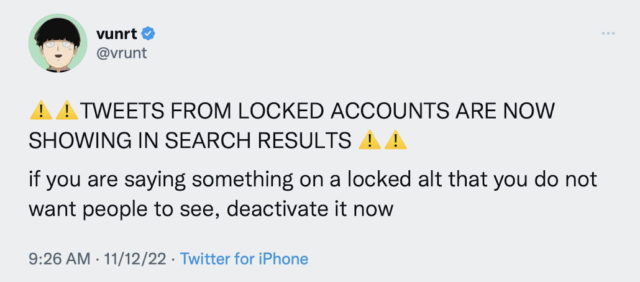A popular destination for participants in the Twitter diaspora has been Mastodon, which broadly resembles Twitter (you have a timeline of people you follow, you respond to their posts, like them, and add them to your own timeline) but is different in some key ways. The most important way is that it’s a distributed network, where people join a specific instance (the term for a server), but can follow people on that or any other instanced.
I joined Mastodon briefly back in 2018 during some other scare over Twitter that I don’t even remember anymore, but the instance I joined is now defunct. With the Twitpocalypse apparently upon us I looked around for a new instance. I was reluctant to join one of the really big instances (like mastodon.social), though I’m now not sure why. Mastodon gives you a timeline of people you follow, but also one of everyone on your instance, so I decided to look for an instance with a community I might enjoy following, and ended up on sfba.social, and you can find me here.
Things are moving pretty fast and people are now recommending joining instances which are well-supported, able to handle the influx of new users, and have good moderation policies regarding the usual racist/sexist/homophobic/transphobic and other shitheads. While I don’t think my instance has been put to the moderation test yet (though it does have a list of limited and blocked instances), they’re doing pretty well on the other scores – it was under 3k users when I joined, doubled that in a day, and is now closing in on 30k, and while there have been a few bumps they’ve been ramping up capacity and asking for donations to pay for it.
As a Twitter substitute Mastodon works pretty well, depending on what you’re looking for, and keeping in mind that it hasn’t yet scaled to anywhere near the size of Twitter. For example, you can’t limit who can reply to your “toots” (as posts are called there), and it’s not even clear how that would work in a distributed system like this. I also don’t think the Legion of Shitheads has yet descended on the Fediverse (as the collection of federated servers is called), so there hasn’t been a real trial of the agglomeration’s moderation facilities.
The web interface is serviceable, and there are some good apps for iOS out there – I’m using Metatext. macOS apps are more of a work in progress: I’m using Mastonaut there, and it’s okay, but (for example) it doesn’t support bookmarks. (I’ve also been using Metatext on my Apple Silicon Macs, and it’s really close as to whether I like it better than Mastonaut there. So far Mastonaut is winning.) I also just started using Toot!, as it released its first update in a couple of years this week and it has good word-of-mouth. (It’s not available for Apple Silicon Macs, though.)
There’s a lot of opportunity for UI innovation in these apps, because for the most part they’re fairly small refactors of the web UI. Maybe Tapbots will fill that space. I wasn’t really around for the era of innovation in Twitter clients over a decade ago, so this is a new experience for me. All the clients I’ve tried so far are superficially similar but can be very different in the details. UI design is hugely influential in whether certain features are discoverable and usable, and if people are using a variety of different clients then that could really impact how the system evolves.
Functionally, I appreciate that Mastodon separates favourites (a.k.a. likes) from bookmarks, as I mainly used likes on Twitter as bookmarks and so was somewhat stingy with what I’d like. I’m starting to use each differently on Mastodon.
I haven’t yet tried the lists feature. I use lists a lot on Twitter, but in an idiosyncratic way: Most people I add to a list I mute from my main timeline, but a few I don’t, and I don’t know if I can do any of that on Mastodon. Lists looks like it’s not yet a first-class feature, as it’s somewhat obscure in the web UI, really obscure in Metatext, and doesn’t seem to be supported yet in Toot! (though it might be coming).
One thing I really miss from Twitter is an unread count for my main timeline. I realize the distributed nature of Mastodon probably makes this a little tricky, but it seems like it ought to be possibly to provide a reasonable estimate. I also miss syncing my read location across my devices, something Tweetbot does really well for Twitter. I read social media across something like 7 devices (3 iOS, 4 Macs), so it gets annoying to always be scrolling up to find the last few toots I’ve read.
It feels like Mastodon is still in its honeymoon period, and I see quite a few tweets indicating that people are aware of that. The culture is a combination of what the software supports, enforces or guides users to, and the norms that long-time users have imposed. If the system continues to grow, I expect those norms will be gradually (and at times abruptly) transformed as newer users vote with their behavior for what sorts of norms they’re willing to follow, and what they want to encourage others to follow. For example, there’s currently a norm of putting a broad array of topics behind content warnings, which hides them until you click on it, and I have a hard time seeing that enduring at the level it is today.
Mastodon seems to have tipped into having a critical mass of users, so I’ve been hanging out there more often. (A few folks I used to follow on Facebook but who dropped off of that platform have also popped up there.) I think it has a lot of challenges ahead of it, though, perhaps as soon as this year. For example, once the shitheads show up en masse I expect there will be many blockings and bannings and evictions, and some sites “defederating” other sites so they no longer receive their content. I think it’s gonna be rough, at times acrimonious, and might take quite a while to settle into a steady state (which I bet will involve several largely-separate federations). And even then it will continue evolving, just as Twitter did, as users find new things they want to and can do with it, and the software maintainers encourage some of those things and not others.
(This doesn’t include the potential issues of the U.S. or E.U. governments turning their eyes to certain instances via – for example – DMCA takedown notices, or other potentially complicated liabilities. Social media in 2022 is not social media in 2010 or 2006 or 1999, as this thread makes abundantly clear (TW: stories of some pretty nasty things the poster saw while working at LiveJournal).)
So far Mastodon gets a thumbs-up from me, and I’ve been using it about as often as I use Twitter, sometimes posting to both places, and sometimes only to one. I can see some of the rough edges and the barriers to entry that it presents, especially to non-technical users. Hopefully its growth will lead to faster evolution of the platform, although as a largely volunteer endeavor there’s no guarantee of that. But it seems to have handled the early waves of the Twitter diaspora fairly well, so I’m optimistic.





